| Hollywoodland | Aug 5 2010 |

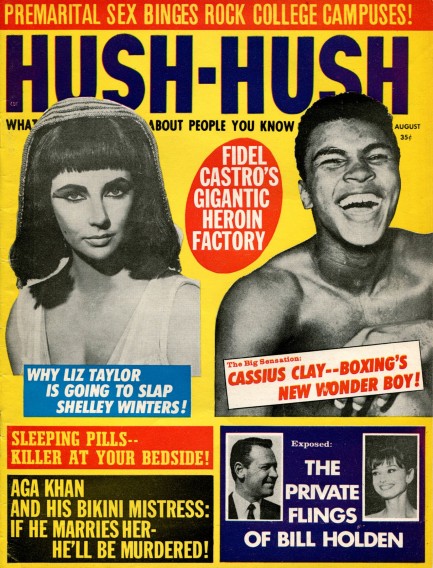
Hush-Hush magazine goes for broke in this issue from August 1963, offering up a slate of tales narrated in their usual breathless style. First, they tell us how Roddy McDowall took nude photographs of Elizabeth Taylor on the set of Cleopatra and tried to sell them, but was thwarted when she “erupted like Mount Vesuvius”. They then demonstrate the limits of their imaginations by telling us that Italian singer Silvana Blasi reacted like “an uncontrollable Mount Vesuvius” when an African-American dancer was hired at the Folies Bergère. Two volcano similes in one issue is bad enough, but the same mountain?
For investigative journalism, Hush-Hush shows us photographs of a dead Carole Landis and an unconscious Susan Hayward, and concludes that sleeping pills are bad. And finally, the magazine stokes the fires of paranoia with two stories: in the first, they explain how Fidel Castro plans to conquer America with heroin, which he’s growing with the help of two-thousand Chinese advisors; in the second, they reveal that the second wife of Dr. Sam Sheppard is a Nazi who plans to revive the Third Reich, and that she’s being helped by—you guessed it—Fidel Castro, who is somehow a communist and a Nazi. Neat trick that.
As we’ve mentioned before, though these stories are laughable, people actually believed them, and believed them by the millions, as evidenced by Hush-Hush’s sales figures. The lesson is clear: the choice between popularity and truth is really no choice at all.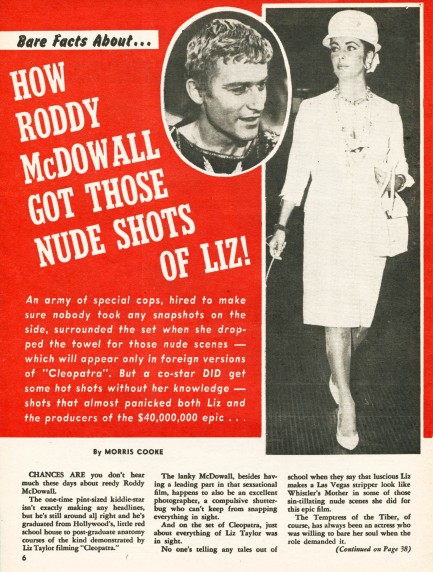
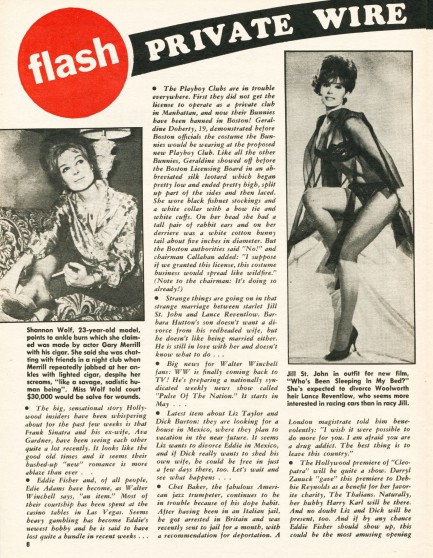
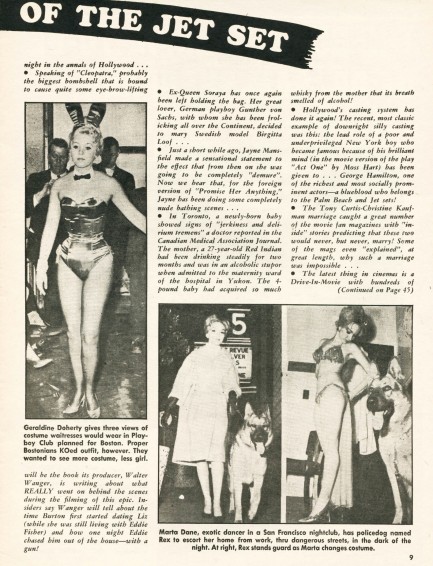
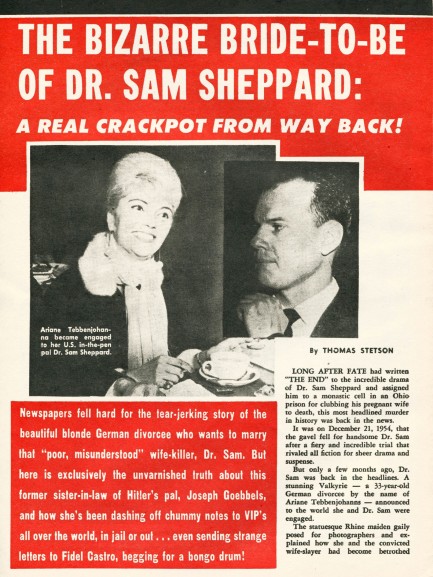
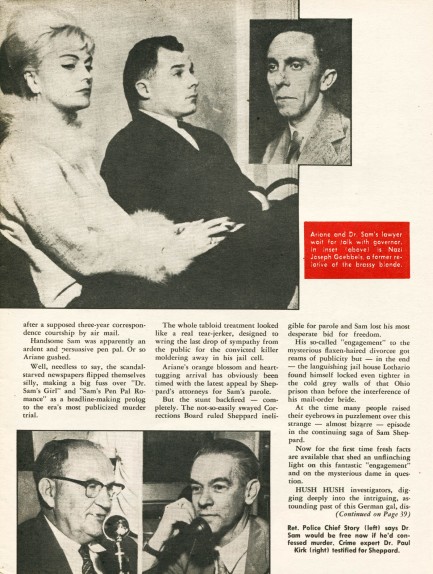
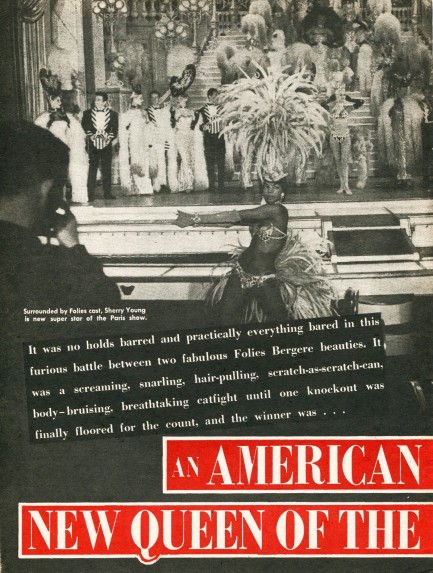
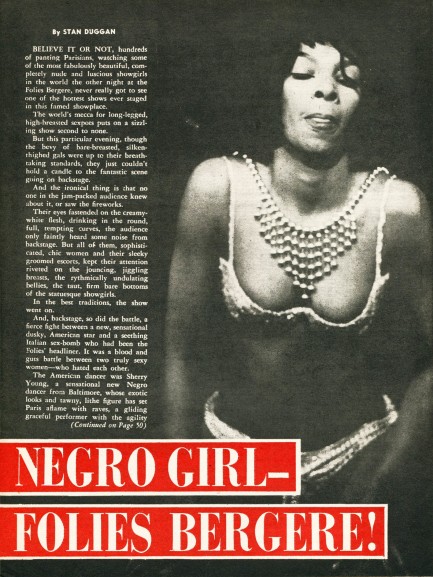
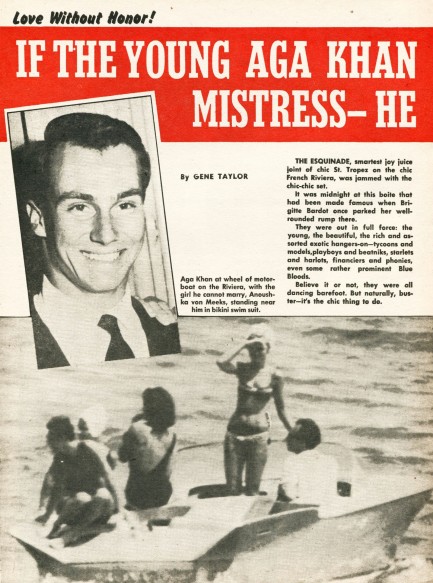
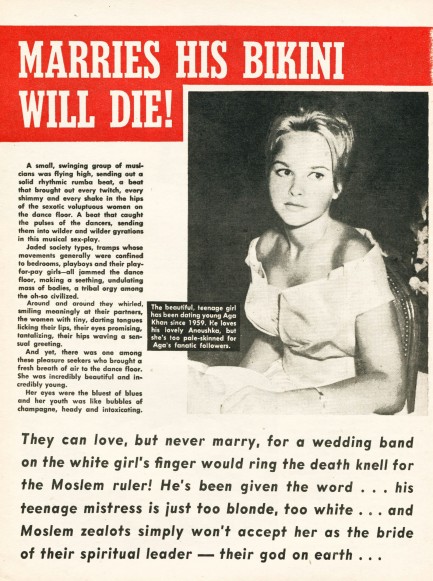
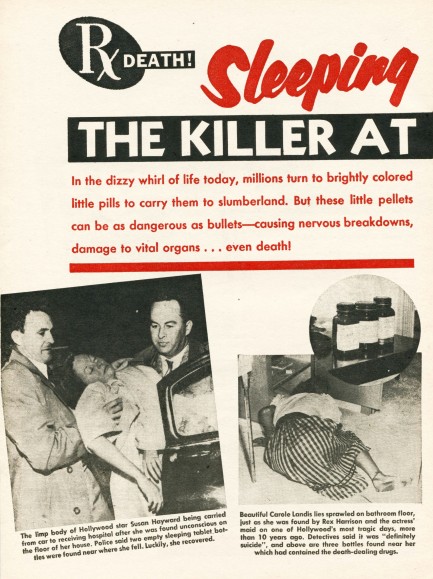
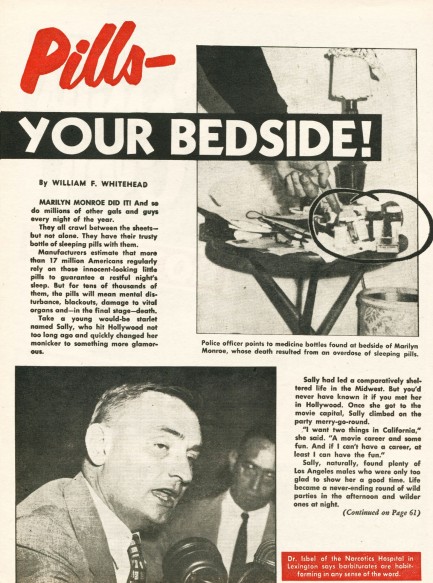
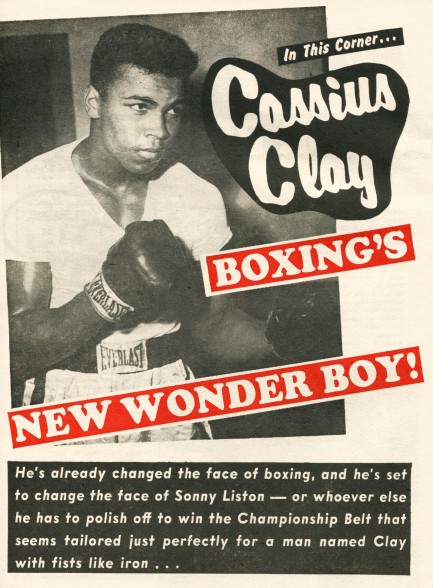
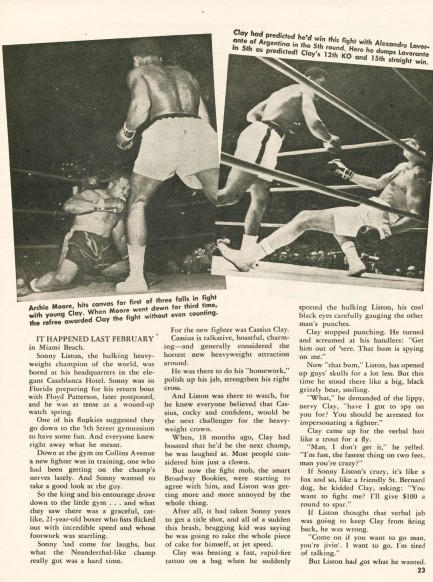
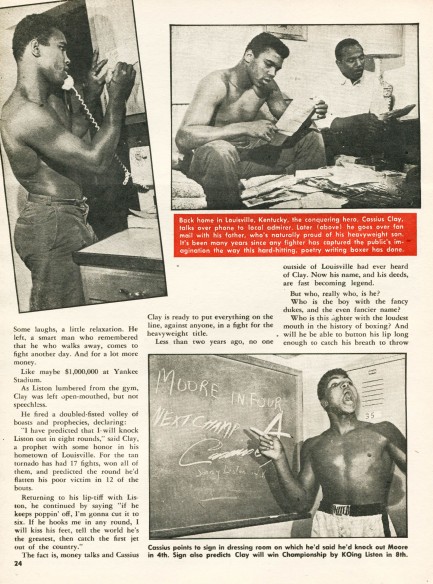
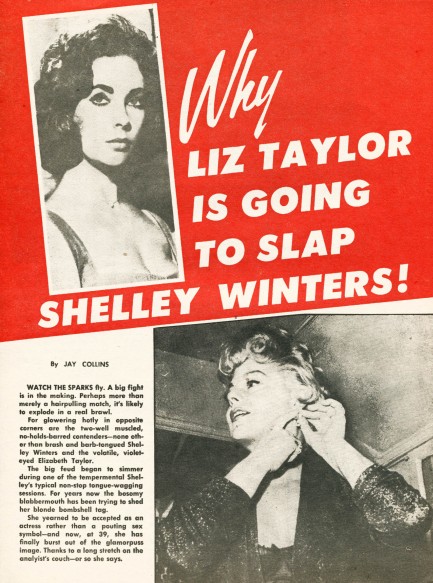
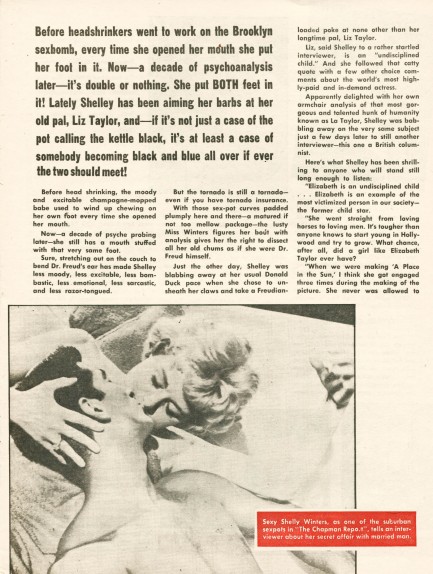
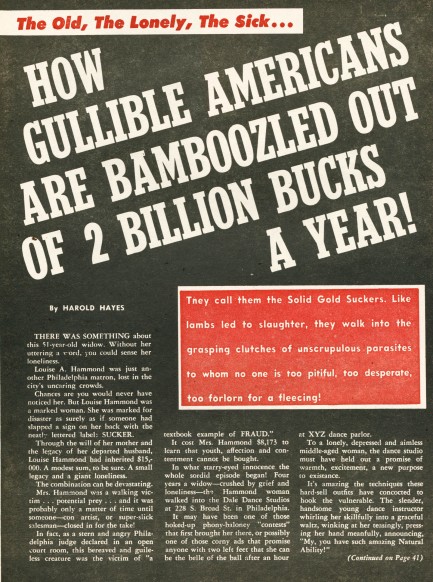
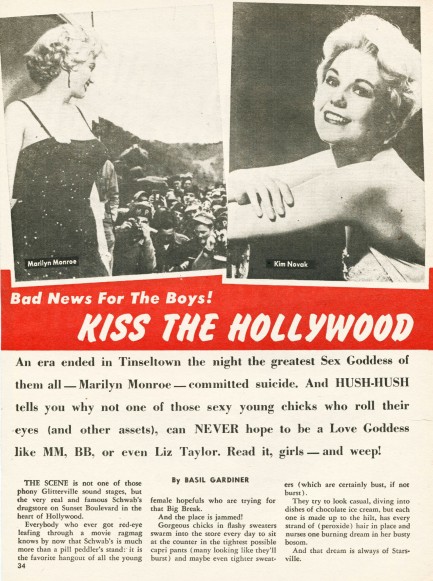
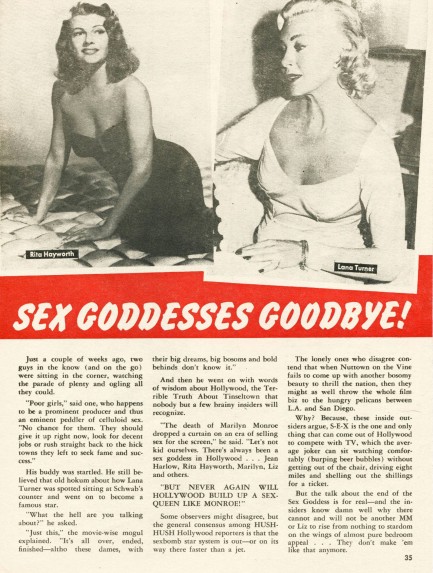
| Intl. Notebook | Mar 24 2010 |

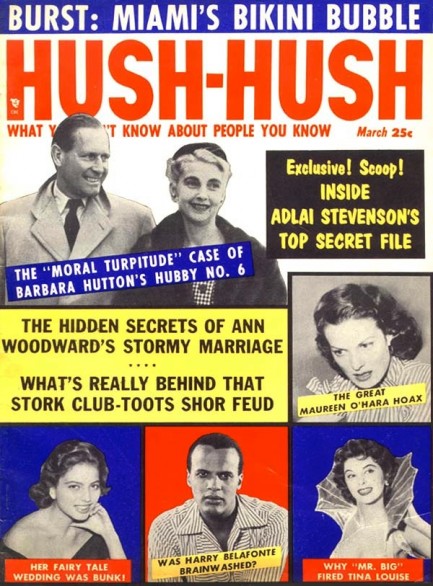
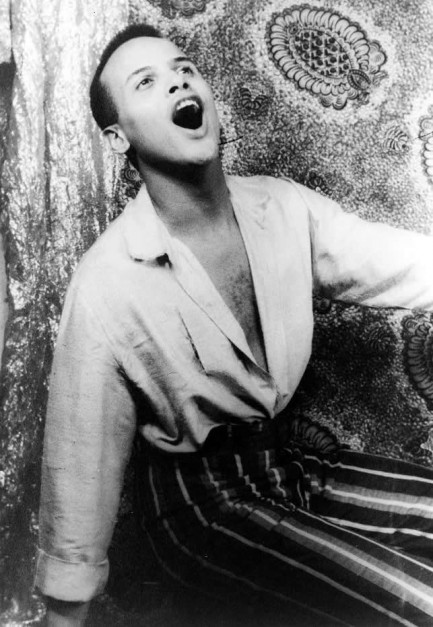 Harry Belafonte gets a spotlight as well, but for political reasons. By 1956 he was a leading figure in the American civil rights movement and was highly critical of U.S. domestic and inter-national policy, and so Hush-Hush does what any respectable red-baiting scandal rag would do—suggest he was brainwashed by communists. While the story is pure baloney, it did turn out to be prescient in one sense—Belafonte did begin explicitly endorsing communist ideals, and remains a supporter of Fidel Castro and other leftist leaders today.
Harry Belafonte gets a spotlight as well, but for political reasons. By 1956 he was a leading figure in the American civil rights movement and was highly critical of U.S. domestic and inter-national policy, and so Hush-Hush does what any respectable red-baiting scandal rag would do—suggest he was brainwashed by communists. While the story is pure baloney, it did turn out to be prescient in one sense—Belafonte did begin explicitly endorsing communist ideals, and remains a supporter of Fidel Castro and other leftist leaders today.| Intl. Notebook | Feb 5 2010 |

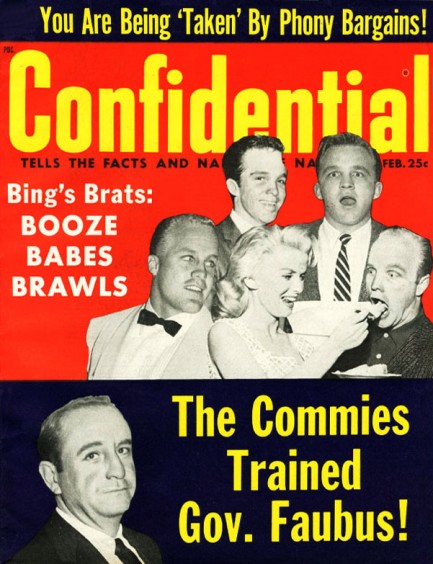
The above issue of Confidential is less visually chaotic than usual on the cover, but packs a wallop inside. The communist tag they’ve slapped on Arkansas Governor Orval Faubus stems from his having attended a leftist school. His political opponent in a 1954 election run-off tried to use it against him, but Faubus won anyway. In 1957, Faubus, at the time facing a serious primary challenge from an unapologetic segregationist, called in the National Guard to close high schools in Little Rock in an effort to prevent black students from attending them. The event made him, for a time, the face of the conservative South, as photos of Faubus speaking to crowds from the front stairs of Central High School circulated around the world. Two years afterward, in 1959, Confidential published this issue. So Faubus was branded a leftist, then a rightist. then a leftist again.
Some historians argue that Faubus, who had been elected student body president at that leftist school (Commonwealth College in Mena, Arkansas), harbored few if any racist beliefs, but by closing Little Rock high schools was merely trying to win an election by proving to the sizable racist electorate in Arkansas that, yes, he too could deny equal rights to African Americans. There’s also the question 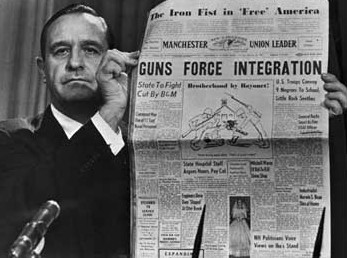 of whether he did it to prevent white mobs from taking violent action against black kids, since he had allegedly been convinced violence was imminent. And it could be argued that if his ultra rightwing rival had defeated him Arkansas would have been far worse off.
of whether he did it to prevent white mobs from taking violent action against black kids, since he had allegedly been convinced violence was imminent. And it could be argued that if his ultra rightwing rival had defeated him Arkansas would have been far worse off.
The first reading paints Faubus as an opportunist, while the second casts him as more of a good-intentioned pragmatist. Both speak to the reality of politics, where sticking to your principles becomes a dodgy proposition when doing it might cost your job. Viewed from the perspective of a black highschooler, any man who enforces the prevailing system of apartheid is a bad man—political realities nothwithstanding. There's no doubt that bowing to racists and fanatics is cowardly by any measure. So what was Faubus—the man—in the end? We may never know.
Needless to say, quite a furor erupted over the revelations. Even today, you can find apologist websites explaining that Bing’s childrearing techniques were not so harsh for the times, and attack websites that paint him as a murderous tyrant. Phillip Crosby disputed many of the claims in
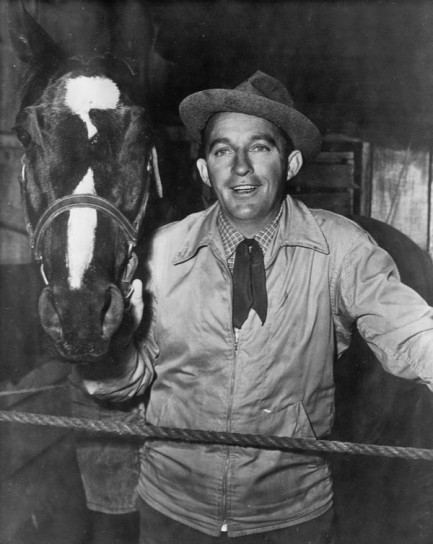 his brother’s book, but Lindsey and Dennis backed Gary’s account. Their suicides by gunshot, six and eight years later, respectively, serve as the debate’s curious exclamation points. But Bing Crosby—whether monstrous abuser or victim of slander—remains an American icon to this day, and books written by other family members portray him as a loving father. As with Governor Faubus, in the end, we may never know what he really was. Both stories prove the old adage true: History depends on who’s doing the telling.
his brother’s book, but Lindsey and Dennis backed Gary’s account. Their suicides by gunshot, six and eight years later, respectively, serve as the debate’s curious exclamation points. But Bing Crosby—whether monstrous abuser or victim of slander—remains an American icon to this day, and books written by other family members portray him as a loving father. As with Governor Faubus, in the end, we may never know what he really was. Both stories prove the old adage true: History depends on who’s doing the telling.| Hollywoodland | May 21 2009 |


This nice issue of Ilustrovana Politika, or Illustrated Politic, was published in the former Yugoslavia. During that unpleasantness known as the Cold War the country was communist ruled but non-aligned, a political stance that resulted in an influx of both Soviet and Western European influences. Movie stars such as Sofia Loren, Brigitte Bardot, and Virna Lisi were featured on hundreds of Yugoslav magazines. American stars snuck in too. This particular cover, featuring Jane Fonda, appeared forty-two years ago this month.
| Intl. Notebook | Mar 30 2009 |

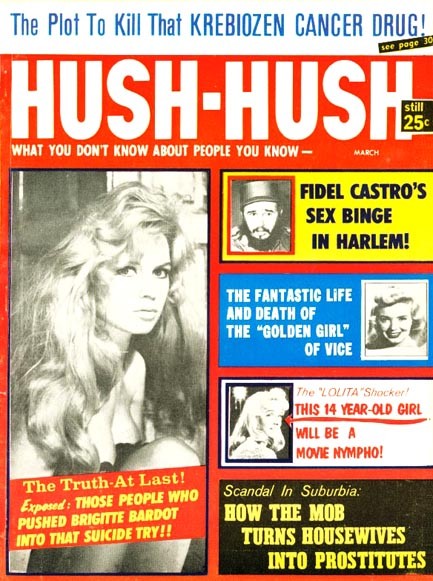
We’ve posted another nice Hush-Hush cover, this one from March 1961, with Brigitte Bardot, Fidel Castro and Sue Lyon on the cover. These tabloids always have such intriguing headlines, so this time we decided to do a bit of research on the stories. What we found was way too interesting not to share, so if you fancy a trip in the Wayback Machine to the year 1961, read on.
The drug Krebiozen, which is mentioned on the banner across the top of the magazine, was an experimental cancer treatment extracted from horse’s blood. Bad as that sounds, it gets downright gruesome when you consider that one horse yielded one gram of the drug, and the extraction process was fatal. That means treating America’s cancer patients would have required the death of every horse on the planet, along with some donkeys and mules, and possibly even a few humans with horsey features. But potential equine extinction isn’t what killed Krebiozen—what happened is its inventor, an Italian doctor living in Argentina named Stevan Durovic, refused to divulge to the American Medical Association or Food & Drug Administration precisely how Krebiozen was made for fear communists would get ahold of it. Or put another way, Dr. Durovic used his political beliefs as an excuse to duck legitimate questions from legislative bodies empowered to ask them.
As the saying goes, if it ducks like a quack it probably is a quack, and there seems little doubt that’s exactly what Durovic was. In the end, a very pissed-off FDA tested a reverse-engineered version of Krebiozen, which showed no discernible benefits for cancer patients. The question of whether they correctly manufactured the drug remains, but we don’t know the answer. What intrigued us most about this story was the fact that no contemporaneous articles we read expressed an iota of concern for potentially millions of slaughtered horses, nor Durovic’s stunning violation 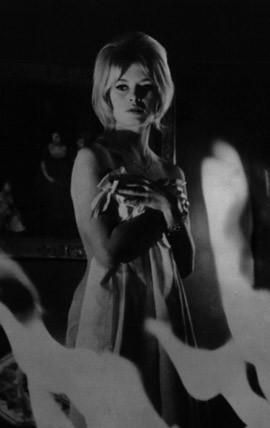 of his Hippocratic oath by publicly wishing harm on innocent cancer patients in the Eastern Bloc. Though we are retro fetishists here, we don’t believe the past, as a rule, was a better time—only that it was more glamorous and, during the 60s and 70s, more artistically daring and sexually freewheeling. None of those qualities compensates for its shortcomings, which the Krebiozen story makes clear.
of his Hippocratic oath by publicly wishing harm on innocent cancer patients in the Eastern Bloc. Though we are retro fetishists here, we don’t believe the past, as a rule, was a better time—only that it was more glamorous and, during the 60s and 70s, more artistically daring and sexually freewheeling. None of those qualities compensates for its shortcomings, which the Krebiozen story makes clear.
Moving down the page, the story about Bardot struck us for one reason—we never heard she was suicidal. We’re actually embarrassed not to have known, but since our go-to reference site—ahem, IMDB—made no mention of attempted suicide, we were clueless. Of course, once we looked elsewhere, several comprehensive bios mentioned it. Bardot’s words on the subject are unflinching: “I really wanted to die at certain periods in my life,” she wrote in her autobiography. “Death was like love, a romantic escape.” It was so romantic an escape, in fact, that she tried to off herself more than once. We think the suicide try referenced by Hush-Hush occurred in 1958, when the Los Angeles Times reported Bardot had swallowed a bunch of sleeping pills after a nervous breakdown in Italy. Probably the maddening Rome traffic pushed her over the edge, which is totally understandable.
Next we hop across the page to where Hush-Hush presses the button marked X for xenophobia: Fidel Castro did indeed visit Harlem. In 1960 he was invited to New York City to speak at the United Nations. His delegation was supposed to stay at the swanky Shelburne Hotel on Lexington Avenue, but when they arrived the management asked his delegation for a $10,000 cash deposit. We don’t know much about lodging diplomats, but that seems a bit unusual, in our view. You’d think details such as payment would have been taken care of in advance, via either the UN or the host government. Anyway, Castro got upset and made a pretty big stink about it, even famously threatening to sleep in Central Park. In the end the Hotel Theresa in Harlem came to the rescue by offering the Cuban delegation rooms, and when Castro arrived there African American crowds turned out in the streets to either cheer him, or 
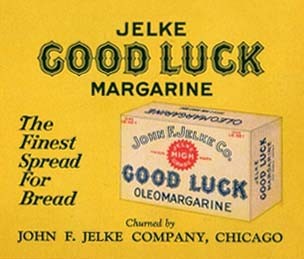 curiously observe him, depending on which accounts you believe. We doubt Hush-Hush’s contention that the visit was some sort of sex holiday, but even if it were, La Barba was divorced at the time, so it wasn’t as if he committed infidelity. In-Fidel-ity. See how we did that?
curiously observe him, depending on which accounts you believe. We doubt Hush-Hush’s contention that the visit was some sort of sex holiday, but even if it were, La Barba was divorced at the time, so it wasn’t as if he committed infidelity. In-Fidel-ity. See how we did that?
The last item we wanted to mention is the one concerning The Golden Girl of Vice. This is a reference to a woman named Patricia Ward, who was an aspiring actress pressed into prostitution by her boyfriend, oleomargarine heir Minot F. Jelke. That’s right—oleomargarine. Good Luck oleomargarine, to be precise, whose slogan was “the finest spread for bread.” Telling you, we couldn’t make this shit up if we wanted to. Apparently Jelke needed an income because his family had cut him off. The fine Ms. Ward proved able, if not necessarily willing, to go ho strolling with the intent of spreading for bread. The whole tawdry set-up fell apart and Ward’s next stroll was into court, where she was the star prosecution witness against Jelke in his pimping trial. The proceedings ended in a guilty verdict and Jelke languished upstate for twenty-one months. The Golden Girl of Vice apparently died sometime before 1961, but we know not when, where or how.
So there you have it—everything you always wanted to know about ’60s tabloid headlines but were afraid to ask. We could have researched more deeply into these stories, but frankly, actual writing was not part of our plan with this website, and we’re way over our weekly limit already. We’ll just add that a cable movie was released in the U.S. in 1995 that revisited the Golden Girl of Vice scandal. It was entitled Café Society and starred Frank Whalley as Minot F. Jelke and Lara Flynn Boyle as Patricia Ward. Reviews were generally favorable and the filmmakers presented a very stylish portrait of mid-century New York City. Might be worth a glance. Now, get back to work people.
For an update on this story click here.
| Vintage Pulp | Jan 12 2009 |

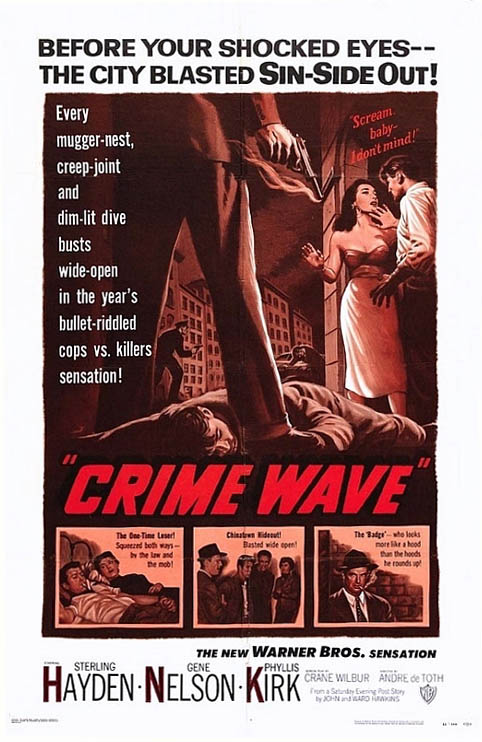
Actor Sterling Hayden was a major pulp figure. Before starring in Crime Wave, acting in other noir films, working as a model, and writing novels, he was a genuine war hero. More specifically, he was an undercover agent with the COI, the American intelligence agency that predated the OSS, and during WWII he ran guns to Yugoslavia and parachuted into fascist Croatia. Despite being decorated for these and other death-defying missions, he later found himself in the crosshairs of the House Un-American Activities Committee for daring to associate with communists. Though he was innocent of any crime, HUAC threatened his career and reputation, and so under pressure Hayden eventually named names. It was a capitulation that haunted him to the end of his life. We’ll have more on Hayden in the future. Crime Wave premiered today in 1954.




































































